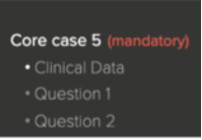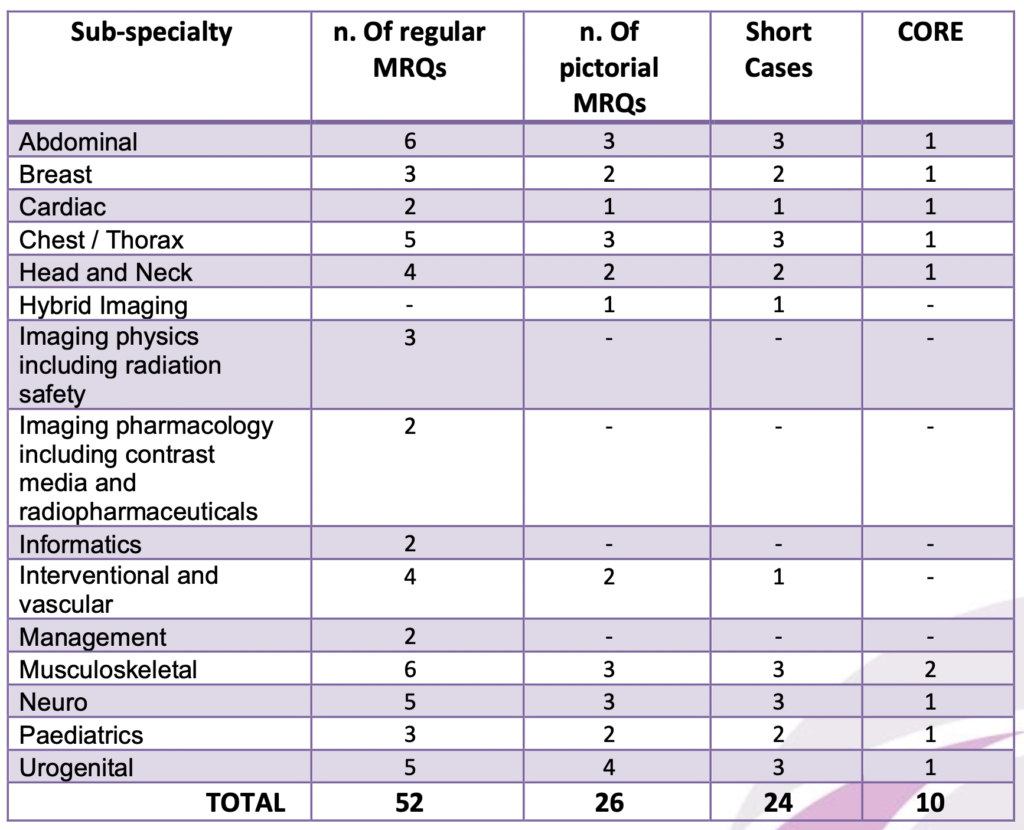EDiR: Scoring of the examination and other FAQs
Frequently asked questions – Applying for the EDiR examination
HOW DO I APPLY?
You can also send you enquiry via email: diploma@myebr.org.
AM I ELIGIBLE?
- Candidates must be in at least their fifth year of national radiology training at the time of the examination.
- Active membership of the corresponding national society in the year of the examination is required.
- Candidates must be ESR full members, corresponding members or members in training in the year of the examination.
WHICH DOCUMENTATION IS REQUIRED?
- A proof of training indicating the duration of radiology training issued by the training institution.
- A proof of practice years as a supervised staff radiologist after your completion of radiology training is required.
A template for the proof of practice years can be downloaded here. - A proof of active membership of the corresponding national society.
- A scanned copy of your passport.
HOW DO I OBTAIN MY ESR NUMBER?
WHAT ARE THE EXAMINATION FEES?
- €500 for full ESR members and ESR members in training.
- Active membership of the corresponding national radiological society in the year of the examination is required.
- €1,100 for corresponding ESR members.
WHAT IS THE PAYMENT POLICY? WHAT IF I CANNOT ATTEND THE EXAMINATION?
- Full payment must be received by the application deadline.
- Only applications for which full payment has been received will be accepted.
- No refund will be provided if an applicant withdraws their application, or does not attend the examination.
- If an applicant is unable to attend the examination due to a justified cause of force majeure, the EBR will charge a fee for re-assigning the candidate to a different examination date. In this case, the new examination date will be decided by the EBR and will have to be in the same year as the original. In no case may the candidate postpone the examination more than twice in a row. If the candidate postpones the examination more than twice in a row, he or she will lose the right to be reassigned to another examination session and will not be entitled to a refund of the examination fee.
It is ultimately the candidate’s responsibility to ensure that they meet the entry requirements for any particular country in order to attend the EDiR examination. The EBR has no influence and cannot accept any responsibility over this matter. Therefore, if a visa is required, we recommend that candidates prepare for it well in advance. The candidate must carefully consider whether there is a possibility the visa application will be rejected or not processed in time. Examination fees will not be refunded if notification of withdrawal is received after the application closing date.
WHAT ARE THE EDiR BENEFITS?
- EDiR is an international certification of your radiological knowledge.
- EDiR certifies that your knowledge of general radiology meets the standards expected upon completion of training, as outlined by the ESR European Training Curriculum.
- EDiR is an added value to your CV and is currently a differential value which will make you stand out from other candidates for a job or fellowship.
WHERE IS EDiR RECOGNISED?
- The Polish national board examination
- The Dutch national board examination
- The Croatian national board examination
- The first section of the Turkish board examination
- The image interpretation section of the Finnish national examination.
- The written part of the Slovenian board examination
EDiR has been recognised by the Indian Radiological and Imaging Association (IRIA) and the Pakistan Medical Commission (PMC) and has significant value in many other countries, such as Belgium, Bosnia and Herzegovina, Estonia, France, Georgia, Italy, Malta, Russia, Slovakia and Sweden where EDiR holders can use their certificate for professional credentialing and classification purposes.
There are a growing number of European hospitals that have included EDiR in their training programmes.
More detailed information can be found in this article.
Frequently asked questions – Scoring
HOW DO I PASS THE EXAM?
The scoring of the EDiR examination has two components:
- Part 1: Weighted written score = 70%xMRQs + 30%xShort_Cases
- Part 2: Clinically Oriented Reasoning Evaluation (CORE)
Pass mark calculation for both parts: <code>Pass mark = Mean – 1xStandard_Deviation </code>
In order to obtain the EDiR certificate, candidates have to obtain a score equal to or higher than the pass mark in each part of the exam.
WHAT IS THE PASS MARK FOR EACH COMPONENT?
The pass mark for each component is calculated using the following formula:
Pass mark = Mean score – 1 x Standard deviation
Even though the pass mark is different from one exam to another, it remains quite stable: pass mark (WWS) = 53% approx. and pass mark (CORE) = 58% approx.
This pass mark is calculated taking into account all candidates taking the exam simultaneously on the same day. However, fixed minimum and maximum pass marks are defined:
- Pass mark(WWS) = Minimum(50%) and Maximum(60%)
- Pass mark(CORE) = Minimum(55%) and Maximum(70%)
If the pass-mark calculated for a specific exam is below the minimum, the minimum pass-mark will be used. This will ensure that all candidates passing the exam have the required competences.
If the calculated pass-mark is above the maximum, the maximum pass-mark will be used. This will ensure that all candidates having the required competences, will pass the exam.
HOW ARE THE MULTIPLE RESPONSE QUESTIONS SCORED?
Each multiple response question has a maximum score of 1 point. There is no negative marking in any of the components of the exam. The multiple response questions are calculated using this formula:

n.Correct = number of answers that the candidate has selected as correct and are actually correct.
t.Correct = total number of correct answers.
n.Incorrect = number of answers that the candidate has selected as correct but are actually wrong.
t.Incorrect = total number of wrong answers.
HOW ARE THE CORE CASES SCORED?
Each CORE case has a maximum of 10 points. These 10 points are distributed among the questions of the case. Depending on their importance, the examiners may decide if some questions have more points than others.
Mandatory cases must be completed. Note that not all examinations contain mandatory cases. Mandatory case are labelled with a red sign next to the case number on the left hand side of the screen. Whenever there is a mandatory case, candidates are required to complete it in order to pass the exam.

A mandatory case has a special score called unsafe. An unsafe score will be assigned when a catastrophic error (an error of observation, interpretation or management) which would have a major impact on the patient is made. An unsafe score will count as 0 when calculating the final score.
In order to pass this part of the exam, apart from having a score equal to or higher than the corresponding pass-mark, it is required to fulfil the following minimum criteria:
- The candidate must complete at least 8 out of 10 cases.
- At least 50% of the cases have 5 points or more.
- The candidate has at most one case with an unsafe
- If the candidate has one case with an unsafe score:
- The candidate must not have any other case/s with 1.5 points or less.
- The candidate has failed at most one other case and their score in the CORE part is equal to or higher than the pass-mark in the CORE part + 5%. If so, their results will be reviewed by the EDiR Scientific Director and the CORE Committee Chair.
- The candidate has at most two cases scored with 1.5 points or less.
WHAT IS THE STRUCTURE OF THE EXAMINATION?
The EDiR consists in three parts with the following duration:
78 Multiple Response that last 95 minutes.
24 Short cases that last 90 minutes.
10 CORE cases that last 90 minutes.
There is a 15 minute break between each part.
HOW MANY QUESTIONS OF EACH SUBESPECIALITY HAS THE EDiR EXAMINATION?
The following 13 categories are included in all examinations: abdominal, breast, cardiac, chest/thorax, head and neck, imaging physics including radiation safety, imaging pharmacology including contrast media and radiopharmaceuticals, interventional and vascular, management, musculoskeletal, paediatrics, urogenital and neuroradiology.

Frequently asked questions – Other information
WHEN WILL I RECEIVE THE RESULTS?
Final results shall be given to candidates in a results report form within 20 calendar days after the exam date and, in any case, shall not be revealed to all candidates but sent individually. The results report form includes the candidate’s overall score and their detailed results in comparison with average results.
WHEN WILL I RECEIVE MY CERTIFICATE?
You will receive an email with a link to your certificate. Please click on the link and a new website will open with your certificate and all the information related to it. You can find more information here
HOW DO I PREPARE THE EXAMINATION?
Please access the quick link Educational resources.
TRAVEL AND ACCOMODATION DURING THE EXAM
The EBR does not provide any travel services, but can provide you with a list of recommended accommodations.
Should you have further queries, please refer to our terms and conditions or contact your EDiR team at diploma@myebr.org.
WHAT IF I DO NOT AGREE WITH MY SCORE?
- An enquiry or appeal procedure can only be requested if it corresponds to the CORE section. The Multiple Response Questions section and the Short Cases section are fully automatically scored, with the exception of the free text questions which are also reviewed by an examiner. As a result, there is no possibility of a dispute for these two sections. Please refer to Examination enquiry and appeal process for full information (deadlines, etc.).
- Candidates cannot base their request for review on the grounds of:
– Lack of candidates’ awareness of exam regulations and procedures.
– Technical issues that were not communicated to the EBR staff or EDiR supervisor on the exam day.
– Mitigating circumstances (such as illness, personal issues) that affect performance and have not been reported to the office or supervisor prior to the start of the examination.